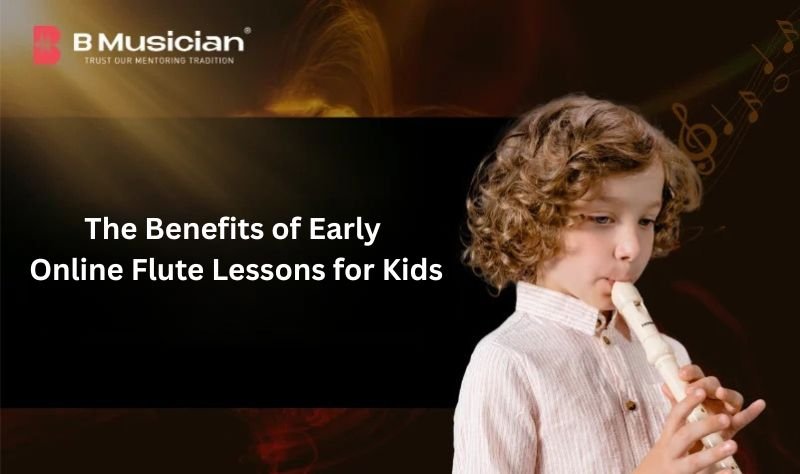Some musical instruments, like the flute, can be tricky to learn, primarily because they require tremendous breath control. For an adult, picking this instrument can be challenging, but for young children, it is not. Moreover, the flute is considered a beautiful symphony of melody, breath control, and creativity that helps develop the minds and bodies of young children. Hence, early online flute lessons for kids not only introduce them to the beauty of music but also boost cognitive skills, discipline, and self-expression.
The flexibility of modern technology allows parents to enroll their children in high-quality online flute programs through platforms like BMusician. These programs make it easier for kids to learn at their own pace, under professional guidance, right from the comfort of home.
Why Start Flute Lessons Early
Early musical education gives children an incredible head start, not just musically but socially and academically. The earlier a child begins structured flute lessons for kids, the more time they have to develop the habits, breath control, and finger agility required for professional-level playing later.
Benefits of starting young:
Enhanced hand-eye coordination.
Stronger rhythm and timing awareness.
Greater confidence in performing publicly.
Early understanding of music theory.
Why Choose Online Flute Lessons
Thanks to advancements in virtual learning, online flute instruction offers the same (and sometimes more) benefits as in-person training. Families appreciate the flexibility of online classes that fit into school schedules and extracurricular activities.
Key advantages:
Convenience: No travel required, reducing time and stress.
Access to Experts: Connect with professional flute teachers regardless of location.
Interactive Learning: Live video lessons with instant feedback.
Flexible Scheduling: Adjust lesson times to suit your child’s school and activities.
Platforms like BMusician specially focus on creating child-friendly learning modules and curricula by introducing a fun element and providing a structured education process. This helps parents also to stay informed about their child’s learning progress.
Benefits of Flute Lessons for Kids
1. Boosts Cognitive Development
When you introduce music to your child, you are actually helping them to develop in different ways. Many studies say that music is a natural booster, meaning it not only elevates the natural capacity of the human brain but also supercharges its memory, problem-solving, and creativity skills. Learning the flute introduces children to reading music, interpreting rhythms, and controlling breath, all stimulating different brain regions.
2. Improves Focus and Discipline
Playing the flute requires concentration on posture, breath, and hand movement simultaneously. Consistent practice teaches children patience and discipline, skills that carry over into academics and other activities.
3. Encourages Physical Coordination
From finger placement on keys to controlled breathing, flute lessons for kids refine motor skills and improve hand-eye coordination. Early mastery of these skills makes learning other instruments easier later.
4. Enhances Listening Skills
Children who learn the flute become more attuned to pitch, tone, and nuance in music and conversation, improving both musicality and communication abilities.
5. Builds Confidence and Creativity
Performing even simple melodies for friends or family builds a child’s self-esteem. They learn to express themselves creatively while gaining pride in their skills.
The Role of Breath Control in Flute Playing
Breath control is central to flute playing. Early beginner flute lessons emphasize proper breathing from the diaphragm, which leads to better endurance and tone quality. These breathing techniques also have health benefits, improving lung capacity and posture.
How Online Flute Lessons Work for Kids
Interactive Sessions: Children connect live with instructors via video platforms. Teachers guide them through exercises, making lessons engaging.
Practice Assignments: Small daily tasks keep learning consistent without overwhelming kids.
Progress Tracking: Parents and children can monitor improvement through milestone achievements.
Performance Opportunities: Some programs include virtual recitals where kids can showcase their progress.
Through BMusician, kids get a personalized learning path designed to suit their pace and interests.
Common Mistakes to Avoid in Early Flute Learning
Skipping Breath Training: Breath control is essential, but often neglected.
Starting with Complex Pieces: Begin with simple melodies to build confidence.
Ignoring Posture: Bad posture can lead to discomfort and poorer sound.
Inconsistent Practice: Short, daily practice is more effective than irregular long sessions.
Avoiding these pitfalls ensures that flute lessons for kids yield the best results.
Encouraging Consistent Practice
Children learn best when they enjoy the process. Parents can encourage practice by:
Setting small goals (learning a new scale or song each week).
Incorporating games into breathing and finger exercises.
Celebrating achievements with family performances.
With skilled guidance from online instructors, even a beginner flute lesson for kids can become the most fun part of a child’s week.
Final Thoughts
Early flute lessons for kids spark creativity, boost confidence, and lay the groundwork for lifelong musical enjoyment. With personalized online programs from BMusician, children can learn from expert flute instructors without leaving home.
Whether it’s about mastering simple tunes or preparing for more advanced pieces, starting young ensures your child develops not only their flute skills but also discipline, focus, and a love for music that lasts a lifetime. If you’re ready to nurture your child’s musical talent, consider enrolling them in engaging, structured online flute classes today.
Frequently Asked Questions:
At what age can children start learning the flute?
Most kids can begin flute lessons around ages 6–8, once they’ve developed basic breathing control and hand coordination. At this stage, they can comfortably hold a child-sized or curved-head joint flute, making learning fun and progressive.
How long does it take for kids to learn the flute basics?
With regular practice and weekly lessons, kids typically grasp the fundamentals of flute playing within 3 to 6 months. This includes learning correct posture, introductory notes, simple melodies, and breath control, which form the foundation for more advanced techniques later.
How often should kids practice flute lessons?
For steady progress, kids should practice 15 to 30 minutes daily. Short, consistent practice sessions build muscle memory and improve tone quality without causing fatigue or frustration.
What challenges do kids face when learning the flute?
Common challenges include breath control, finger coordination, and producing clear notes. With patient guidance and gradual skill-building exercises, kids overcome these hurdles and develop stronger technique over time.


















